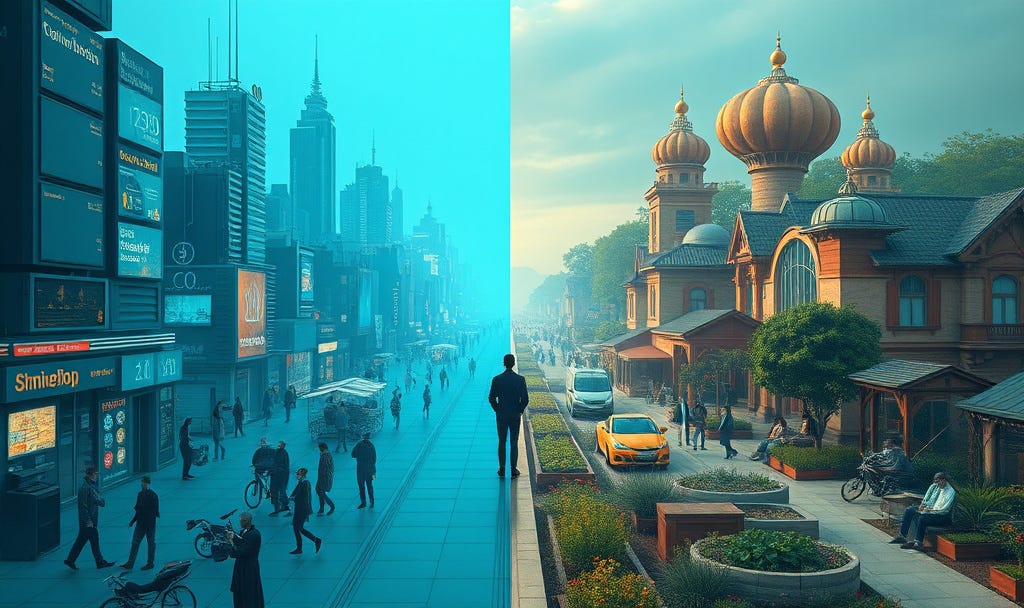In this article, you’ll discover:
The coming divide - Why society is splitting into two distinct paths: the technocratic digital world accelerating into AI saturation, and analog communities returning to land-based, neighbor-connected living
Analog vs. Digital as the fundamental choice - How the real question facing humanity isn’t about destroying evil, but about which reality you want to inhabit and build
Why parallel societies are already forming - The signs that alternative communities are emerging: Substack’s explosive growth, declining vaccination rates, healthier lifestyle returns, and cities with minimal corporate influence
The path from concept to lifestyle - How more people asking “how do I build this?” and “how do I live this sustainably?” will illuminate the hidden path back to analog living
A note before we begin: This article started as a Sunday morning voice note—the moment I realized that phone addiction and parallel societies are two sides of the same question: which world do you want to inhabit?
What you’re about to read is the organized vision. The full podcast has the raw connections, the 2030 speculation, the Florida example, and the complete breakdown of how digital traps and debt keep us locked into the technocratic system.
If you want the unedited exploration—including whether evil can be stopped and how these analog societies actually get built—become a paid subscriber to access the podcast archive.
For now, here’s the core truth: We’re not going to destroy the technocratic world. But we can build something parallel to it—and the choice of which world you inhabit is yours.
Greetings, this is Franklin O’Kanu. I just finished a podcast on why we can’t get off our phones, and I had an idea about parallel cities. But I didn’t want to mix up the two, so this piece here is going to be specifically about parallel societies—not parallel towns, but the idea of parallel societies.
What Are Parallel Societies?
For a quick background on what parallel societies are, the idea is that you have two societies. You have one very mainstream society—individuals who do everything that they’re supposed to do, everything that the mainstream says.
And then you have these other societies that are opposite to that. These are societies that have different rules, different foundations. They’re very different than the mainstream society, but these two societies still exist side by side, closed off in their own ways.
What is coming to mind right now is the world I wrote about in 2030—how what we will see is a technocratic society working ten times harder than it does now. AI will be all over the place; you can’t trust what you see. It’ll just be ten times worse. Compared to that will be societies where people are just outside, living on the land with their neighbors, living the life before.
The Analog vs. Digital Choice
As I talk about this now, what you really have is either the analog life or the digital life. And so, which one do people want? Do they want the analog life or the digital life? That’s another topic to write about.
But the idea is that society will start to reflect this. It will reflect the digital life, then the analog life. Of course, there’ll be some intertwining, but for the most part, you’ll have these analog societies. And what happens is you have a parallel society.
Because let’s face it—there’s no way I can foresee us destroying evil, whatever that looks like. That’s another article—I don’t think we’ll ever destroy evil. Evil is a part of existence. But what is happening now is so far gone that evil is just rampant. And can it be stopped? I think it can, but you have to be very strategic, and there will be a lot of resources needed to do so. I think we can get there, but we would all have to be on the same page. But that’s a lesson for another piece.
Can We Create Parallel Societies?
Can we create parallel societies? Absolutely. Most definitely. These can probably start, and there are probably already some parallel societies out there. They may be rural in nature. There may be cities where individuals have taken control of their local governments and where there is little to no corporate influence. They are operating as analogously as possible in their ideas and thoughts.
This movement will need to unplug from the digital traps. These digital traps are things like debt or just the digital world itself. And the more we talk about the perils of the digital world, the more people are introduced to the idea of an analog society—going back to analog.
And if we can show the benefits of it, more humans, more spirits, will say, ‘Well, hey, I want that life. I want to be happy. I want to be joyful. I want to have a purpose in living life.’
And if we can show that, more people will start coming into this analog lifestyle. But what also happens is that more people start identifying—well, how do I build this lifestyle? How do I live this lifestyle? I don’t want it to just be a phase. I want to live this lifestyle.
And I think that’s where we all are in our current walk of life. How do we live this life in a way that is sustainable and makes life worth living? It will be a journey because the path has been hidden from us for so long. But I think—I’m actually pretty confident—that if we put some time and attention to it, the path begins to illuminate.
Signs of Change
What comes to mind right now is an idea I’ve seen—this graph showing that Substack is the number one growing platform in the United States for media. And the idea is, wow, that’s a huge opportunity to reach so many people and to educate them on the perils of this world and where this world could go.
There are new voices that will become the faces of not just media but also avenues to raise consciousness. And so the idea of a parallel society can happen. You are seeing trends—you are seeing decreases in vaccinations, and healthier lifestyles coming back. And what you now need is a state like Florida to really start to make some waves.
I think there are things to fix in Florida, but there are plenty of opportunities, and it does look like an ideal state. I hate using statements like that without diving into the details to verify this, but all in all—analog versus digital, parallel societies—I’m looking forward to seeing where this goes.
Thank you for the time and the attention. Have a great day.
—Ashe,
Franklin O’Kanu
If you enjoyed this work and gained value from it, support more work like this by becoming a paid subscriber for $5/month
If you’re already aware but want to take a step toward becoming the best human you can be, you can check out my guide.
11 Insights for Being The Best Human This 50-page guide is the clearest map I’ve created for navigating the madness of modern life. It blends ancient wisdom, spiritual clarity, and grounded daily ritual — helping you remember who you are and why you’re here.
If the world feels off, this guide will confirm why — and help you take back control.
Support Unorthodoxy!
If this article opened your eyes, there’s more behind the paywall. Exclusive, in-depth pieces that go deeper, challenge more, and reveal the truths they don’t want us to see.
🔑 Become a paid member and gain access to premium and archived articles, exclusive podcasts, and thought-provoking chats you won’t find anywhere else.
📖 Prefer a comprehensive take? My book, An Unorthodox Truth, is a fact-based journey through 200 years of deception—a must-read for those seeking clarity in a manipulated world.
☕ Feeling generous? Leave a simple tip to support this work—every bit helps me continue creating meaningful content.
Listen to this episode with a 7-day free trial
Subscribe to Unorthodoxy to listen to this post and get 7 days of free access to the full post archives.












